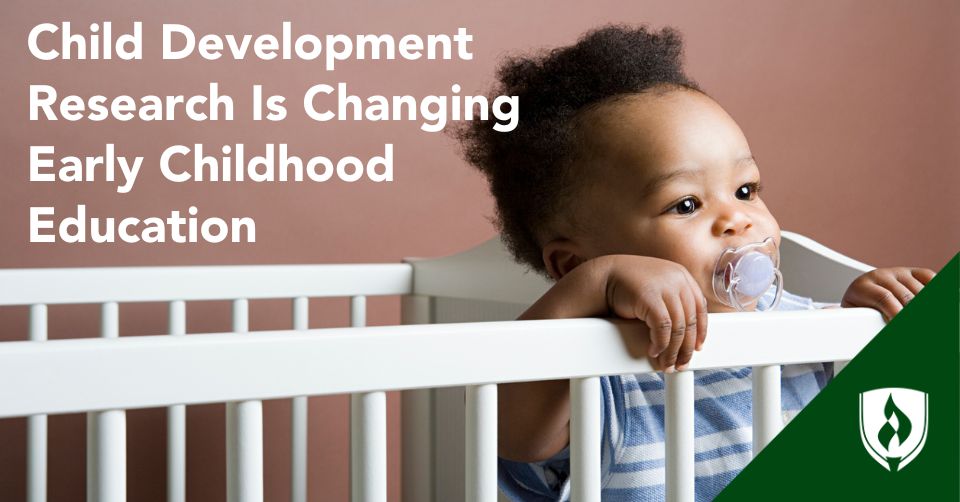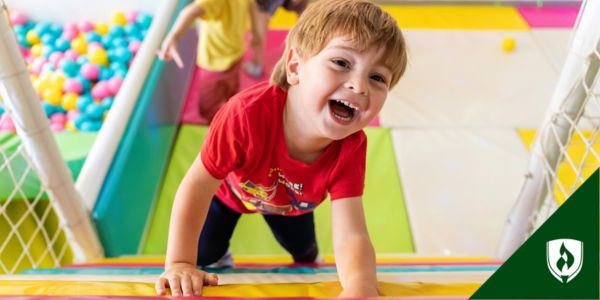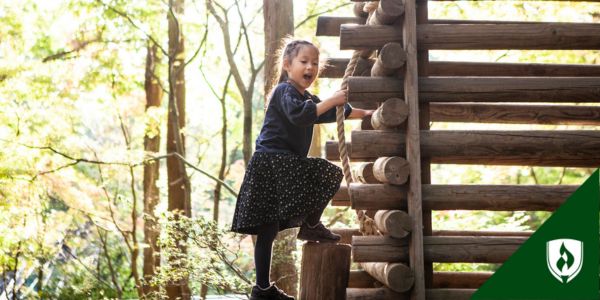
The brain of a young child is an incredible thing. During the first five years, neurological growth is rapid, according to Dr. Deidra Boodoo, an Early Education Instructor at Rasmussen University. It's because of this that early childhood education can impact someone's entire life.
The importance of early childhood education is very clear in research, as well as in its larger impact on our society.
But this wasn't always something we understood, and the field of early childhood is still under the shadow of misconceptions. Many people (including parents and families) still treat the first five years of a child's life as primarily about survival—and childcare as someplace to put their children until they are old enough for school.
But we know a lot more now than we used to. From infants internalizing body language to toddlers experimenting with cause and effect, the early years of childhood establish what our brains will be able to do for the rest of our lives.
How do we know this?
Thank the child development researchers and psychologists who’ve studied little ones’ growth for generations. Their work has been instrumental in shaping the early childhood education (ECE) field.
As teachers know, a child’s environment and educational experience are closely linked with their ability to reach key developmental milestones. What has child development research taught us? And how do ECE professionals use those findings to help foster social and emotional growth, motor skills development and academic achievement in young kids? Read on and find out.
How child development research is reshaping early childhood education
Here are four critical findings from child development research that are revolutionizing early childhood education as we know it.
1. Children do better in school when families and teachers work together
Citing dozens of studies, the National Center on Parent, Family, and Community Engagement (NCPFCE) explains that family involvement in childcare, preschool or other school environments has a huge impact on children’s mental health and overall academic success.1
If you work with little ones, you'll understand how much sense this makes. Their family members are their whole world.
Professionals in the ECE field now strive to integrate more adult support into ECE programs. For some ideas on how they do this (and a bit more on why this matters so much), check out 9 Ways to Improve Family Engagement in Early Childhood Education.
2. It's time to rethink discipline and punishments
Decades of research have challenged the efficacy (and potential damage of) corporal punishment, or physical discipline.2 But you might be surprised to learn that child development research now indicates that even non-physical punishments may not yield the best results.3
“Punishment is not necessary at all to help children learn better or to teach them more appropriate behaviors,” says Joni Kuhn, Early Childhood Instructor at Rasmussen’s School of Education.
“Back in the 90s, we used to give time-outs," she says. "Now, we know that is isolating a child does not help teach them about why what they did was not okay and what they could do better next time.”
This stems from research summarized by the National Association for the Education of Young Children® (NAEYC®).4
"Conventional discipline too easily slides into punishment,” writes Dr. Dan Gartrell. “Punishment makes young children feel stressed, hurt, rejected, and angry; these feelings make it harder for children to learn emotional and social skills.”4
Offering children guidance (as opposed to punishment) is a better way to build relationships and improve behavior. Adults can easily forget that children don't know things until we teach them--including behaviors like emotional regulation, patience and positive interactions with others. Research is clear; we get better results when we guide them.1
“I wish more parents knew that they don't have to punish their children. If you treat them with respect, there are far fewer power-struggles," Kuhn says. This is a better way for the child to learn, "and it would lessen parental stress tremendously,” says Kuhn.
3. Apologies don’t always equal remorse
There's a long-standing tradition of forcing children to apologize when they've done something wrong or made a mistake. Parents and teachers of course want to teach children to be accountable for their actions.
But this is one of those ingrained habits that research really doesn't support. And it can do more harm than good.
"In 2025, forcing them to apologize is something we know we should not do," Kuhn says. She explains that this practice is more of a power struggle that tends to result in children saying they are sorry when they don't mean it or even really understand it.
As research shows, children recognize when intervention from an adult prompts one of their peers to offer an insincere apology.5 So what does making a child say sorry really teach? What lesson do they learn from this practice?
4. Children need to see respect to learn it
“Children are learning about the concept of respect," Kuhn says. When they are very young, the abstract idea of respect is impossible for their developing brains to understand. And the behavior adults are often looking for when they demand a show of respect from their children can be pretty complicated, especially when adults don't demonstrate that kind of respect back to the children.
For example, if parents and caregivers raise their voices or shout at children, children will mimic that. Children are also just like adults in the sense that they can only pay attention to so many things at once. If they are focusing on something they are doing, like building blocks, they are absorbed in it, their brain is busy. Expecting them to snap to attention the moment we speak to them is unreasonable. We don't treat our colleagues, friends or other adults that way.
“Respect is not a concept that they will be able to internalize or fully understand until their late teens/early adulthood," Kuhn says, "It’s a ‘higher order’ cognitive concept." Until then, we need to model the kind of behaviors we want children to copy.
“We must treat children with respect first, and we should not expect it back," Kuhn says. We need to understand that they are learning this from us and the learning takes some time. Their brains are doing a lot in these years.
Child development research vs. early childhood education regulations
Unfortunately, as Kuhn explains, regulations for child care centers and early childhood education programs are sometimes at odds with child development research. For example, ECE researchers know that playtime is one of the most developmentally important parts of a child's life. But it's difficult to implement in organized classroom environments and often gets pushed to the sidelines.
“I would like there to be fewer rules and more free play for children,” Kuhn says.
Another example is in roughhousing. We know that rough and tumble play is important for healthy development, stress regulation and proprioception. (For more on that, check out What Is Rough and Tumble Play? An Educator’s Guide.) But regulations for child care centers and preschools typically discourage kids from being rowdy.
Ongoing early child development research is critical
Language learning is one part of human development that certainly still warrants further study.
“I’d like to see more child development research with a focus on language development in infants and toddlers, or children from birth to age five,” Boodoo says. Learning language, of course, is essential for communicating effectively during early childhood as well as later in life. And much about how the early brain processes language is still unknown.
Children need language skills to develop reading comprehension skills, for one thing. And reading has a huge impact on academics, confidence, etc... Many things in ECE are like this. Something that seems small in infancy ripples out into the rest of a person's life. If we truly understood even the first year of the human brain, it would likely change a great deal of how we treat child care and infancy as a society.
Understanding child development can change everything
If you are curious about the developmental process that takes place from birth to age five, the field of early childhood education needs you! Dive deeper into the research surrounding children’s cognitive functions and consider studying Early Childhood Education.
An ECE program will not only dive into all we know and don't know about development, it can also lead you into pathways and career opportunities you may not have considered.
See some of the benefits of an ECE program at 10 Reasons to Pursue Your Early Childhood Education Degree Online at Rasmussen.
National Association for the Education of Young Children® and NAEYC® are registered trademarks of National Association for the Education of Young Children.
1Families as Lifelong Educators, (accessed 4/15/2025), Families as Lifelong Educators
2American Psychological Association, Is Corporal Punishment an Effective Means of Discipline?, (2002), Is corporal punishment an effective means of discipline?
3Mental Health America, Discipline and positive behavior support in schools, (accessed 4/15/2025), Discipline and positive behavior support in schools | Mental Health America
4Dan Gartell, Instead of Discipline, Use Guidance, (accessed 4/15/2025), Instead of Discipline, Use Guidance | NAEYC
5Craig E. Smith, Deborah Anderson, and Anna Straussberger. Say You’re Sorry: Children Distinguish Between Willingly Given and Coerced Expressions of Remorse. (Apr.2018) https://doi.org/10.13110/merrpalmquar1982.64.2.0275




